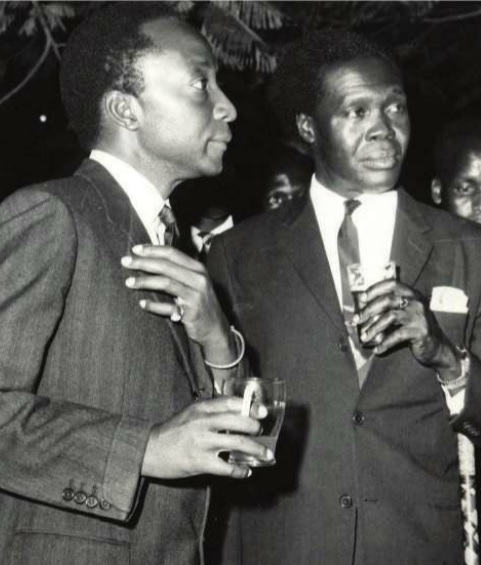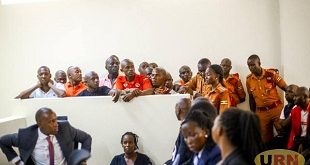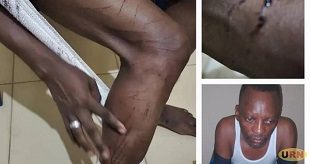
Kampala, Uganda | THE INDEPENDENT | It is improbable to list events that form a significant part of Uganda’s history and miss the 1966 attack on the palace of Kabaka Fredrick Mutesa II by the army under the command of then Col. Idi Amin Dada. Diverse accounts have been written in relation to the attack, which saw the Kabaka flee to exile and reduced to a life of a pauper surviving on state stipends and contributions from friends in England.
The then Prime Minister Apollo Milton Obote who ordered the attack has been widely chastised, with many seeing him as an insecure self-seeking ruler who invaded the palace to protect his political ambitions. In his book “Protection, Patronage or Plunder? British Machinations and Uganda’s Struggle for Independence” former Deputy Katikkiro of the Buganda Kingdom, Apollo Makubuya describes Obote as “The tribally minded, dishonest and power-hungry Obote (who) was prepared to destroy anyone who stood in his way to obtain power in Uganda”.
In a posthumous book publication, former Vice President of the Uganda People’s Congress-UPC Joseph Bossa offers a different view. He refutes the understanding of the attack that placed sole responsibility on Obote. In his 248 paged book titled “Statehood on Trial, Thoughts on the 1966 Uganda Political Crisis” Bossa, goes on to demonstrate how the Crisis was a contest to unite the State of Uganda rather than a fight against the person of the Kabaka.
In the book published by the Makerere University Press, Bossa positions the question of the lost counties of Buyaga and Bugangazzi or Bugangaizi as the primary factor that soured the relationship between Mutesa and Obote leading to the 1966 conflict. The counties originally part of the Bunyoro Kingdom were rewarded to Buganda by the colonialists through the 1900 Agreement.
During negotiations for Uganda’s independence, it was agreed that a referendum be held in the two counties for people to decide on whether to remain as part of Buganda or return to Bunyoro. Parliament passed the Referendum bill and asked Mutesa, as president, to assign it.
“He agonized whether he should fulfill his duty as a president and betray that of Kabaka to preserve the Buganda Kingdom by effectively signing away Buganda’s territory or defend his Kingdom as Kabaka and thereby breach his oath as President of Uganda,” writes Bossa.
History has it that Mutesa declined to sign the bill. Obote hence evoked his powers as the Prime Minister and assented to the law. A referendum was held in 1964 with voters choosing to return the counties to Bunyoro. The outcomes displeased Mutesa who later wrote in his memoir titled “Desecration of my Kingdom” that it was agreed during negotiations for Independence that the referendum would be conducted in “not less than three years if the Prime Minister wished it”.
But in a new frame of mind, Bossa says the Kabaka just expected the Prime Minister not to do anything about the referendum because it would be prejudicial to the interests of the Baganda. He also says that it’s not true that the referendum was supposed to be held in not less than three years.
He rather opines that, The Uganda (Independence) Order-in-Council of 1962 talked of the referendum being held “on such a date, not being earlier than 9th October 1964 as the National Assembly may, by resolution appoint”. Bossa argues that perhaps, the three years Mutesa talked about were his estimation of the period it would have taken the Ndaiga Development Scheme to bear fruits.
After Independence, Mutesa established development projects in the two counties and ferried ex-servicemen famously known as Abaseveni, from other parts of the Kingdom to acquire land and settle in the conflicted counties. “Mengo had hoped that by introducing development projects in the area the Banyoro would be induced to vote to stay in Buganda while new migrants would out-vote those Banyoro who did not want the counties to remain part of Buganda,” writes Bbosa.
Mutesa’s plan however flopped as the majority of voters chose to return to Bunyoro. Bossa says this marked the point where Mutesa began seeking allies to safeguard his interests. He says Mutesa then worked with his confident Daudi Ocheng and then Secretary General of the Uganda People’s Congress-UPC Grace Ibingira, and army commander Brigadier Shaban Opolot to fight Obote.
It is told that one of the events that built up to the palace attack was the “visit” Brigadier Opolot paid to Obote while on a tour to the Northern part of the country. In his memoir, Mutesa wrote that the Brigadier (Opolot) had gone to deliver a message from the cabinet but Obote thought Mutesa wanted him arrested so he flee temporarily.
But Bossa, without making direct reference to Mutesa’s assertions questions the motive behind sending the brigadier. “Was it the practice for the Brigadier to be the one to deliver such news?” he wonders. Bossa says that if Obote had abstained from the question of the lost counties, the newly established state would have fallen into jeopardy.
He says Bunyoro conditioned their participation in the Independence talks on the return of their counties. Bossa thinks Bunyoro wouldn’t have rested without a referendum as promised. In summation, Bossa writes that while different people respond differently to military defeat and triumph, the people of Mengo seem to have decided to cultivate a culture of mourning, especially centered around the attack on the Lubiri on May 24, 1966. He argues that some people have used it as political capital to further their ambitions other than heal society through truth-telling and reconciliation.
*****
URN
 The Independent Uganda: You get the Truth we Pay the Price
The Independent Uganda: You get the Truth we Pay the Price



A nice book for reading
Mr. Bbosa, I was just a six year old Primary two pupil in Katikamu Subcoubty of Bulemeezi County;
Indeed they “chose to mourn instead of reconciliation”
At that tender age I witnessed pain among the community,deatha at hands of ” powerful people ( the “Special Force”, I heard some had run and hidden under beds, but were followed up and shot, some because they were by the road side.The burials being threatened by a Flying helicopter
At alater date I heard of a story “they kept complaining of lack of air to breathe but we continued covering them with earth” a senior female citizen from Eatern Uganda, while on TV made a comment on that very act
What is reconciliation?
How does the rest of Uganda treat those who should seek reconcilliation
It is always a one way the “victims” are expected to reach out to their “tormentors”
Did they say, “aftersome time, one passes by the mother’s grave humming the most favourite tune “
If this was a constitutional affair
Let this “Party of ideas”, the “great Party”carry out an audit from then to date:
The objective : to determine the extent to which unfair treatment has been influenced by the events,
Period: 1964 to 2023
Variables: treatment implicit but propagated and deliberate brainwashing
“Our lives transformed from formative stage”